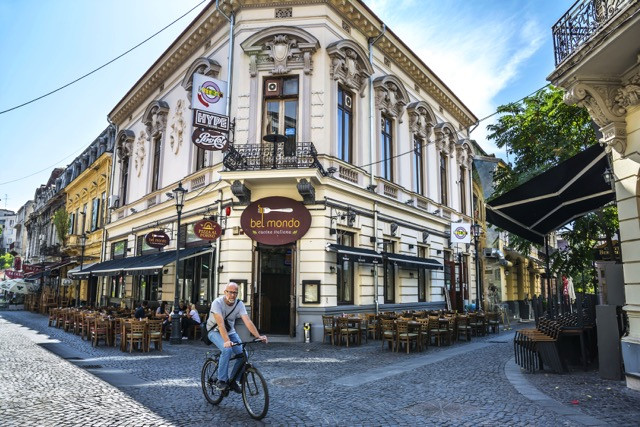Southern and eastern European countries are more concerned about emigration than immigration, according to a wide-ranging survey of attitudes in 14 EU countries.
In Spain, Italy, Greece, Poland, Hungary and Romania, six countries where population levels are either flatlining or falling sharply, more citizens said emigration was a worry than immigration, according to the poll by the European Council on Foreign Relations (ECFR).
The steepest falls are in Romania, where the population has decreased by almost 10% over the past decade as an exodus of mostly young people move to work in western Europe.
However, in northern and western nations, concerns over immigration far outstripped those over emigration.
The survey was conducted to establish the principal issues of concern ahead of the European parliamentary elections in May. The 14 nations polled will occupy 80% of the seats in the new parliament.
The poll discovered that Europeans are concerned about far more than migration, even though it has dominated EU politics and discourse over the five-year term of the outgoing parliament. Corruption, nationalism, terrorism and climate change are also uppermost in minds.
In the survey as a whole, 20% were worried about emigration and 32% about immigration. The poll was conducted by YouGov and questioned almost 50,000 people.
In some countries, the fear of emigration was so great that large numbers of people believed compatriots should not be allowed to leave their country for long periods of time.
“The EU elections have been sold as a battleground over the heart of Europe,” said Mark Leonard, the director of the ECFR, adding that nationalists were trying to turn the vote into a referendum on migration.
Still votes to be won
“The findings from this poll should give heart to pro-Europeans, and show that there are still votes to be won on major issues such as climate change, healthcare, housing, and living standards,” Leonard said. “They will be making a strategic blunder if they accept the framing of the anti-European parties that this election will be won or lost on migration alone.”
Populist leaders like Hungary’s Viktor Orbán and Italy’s Matteo Salvini are seeking to put migration front and centre of the 23-26 May polls, in which 374 million people are eligible to vote in a new parliament for a five-year term. The Orbán government recently deployed a scare poster warning about migration policy in Brussels.
Hungary has refused to take refugees under an EU quota system and continues to block an EU law that proposes a permanent redistribution system for asylum seekers. The poster referred to this theme, stating: “They want to introduce compulsory relocation quotas.”
Orbán, who is under pressure to quit the main centre-right European parliament group, has called for migration policy to be “withdrawn from the commission and returned to the member states”. EU member states already play the decisive role in migration policy.
While Orbán has scaled back his media attacks, following pressure from allies in the European People’s party, he has indicated that he could resume his anti-EU campaign. “Our job now is to continually inform the people about what Brussels is up to.”
But immigration numbers have fallen sharply over the past two years: in 2018, the number who crossed the Mediterranean was put at just over 116,000 by UNHCR, down almost 90% from those who made the journey in 2015.
Priority for the environment
The survey found that Islamic radicalism was the top area of concern, worrying about one in five Europeans, though fears were much higher in countries like Belgium, France and the Netherlands than in eastern Europe.
In almost all countries, a majority of people agreed that the environment should be made a priority even if it damaged economic growth.
But the data also showed a wide range of concerns cropping up in different countries, meaning that the election will be fought on different issues across the continent.
The economy was the single biggest concern in Italy, Romania and Greece. In seven countries – Hungary, Italy, Poland, Romania, Spain, Greece and Slovakia – more than 50% of people surveyed said corruption was a major issue.
Some experts have warned centrist and traditional parties against accepting a pro-EU versus anti-EU narrative, fearing it will only bolster populists by setting up straw-man arguments.
The European elections are the second-largest electoral contest in the world, behind the Indian elections. Voters in 27 countries are due to elect 705 MEPs, who will take office on 2 July. The UK is not scheduled to take part in the vote and will have to inform the EU by 12 April if it wishes to elect MEPs, meaning a long Brexit delay.
By Mark Rice-Oxley and Jennifer Rankin in Brussels
*This article is part of a long-running collaboration known as “Europa” between the Guardian and five major European newspapers, Le Monde, Süddeutsche Zeitung, La Stampa, La Vanguardia and Gazeta Wyborcza, all of which are publishing this piece today.
